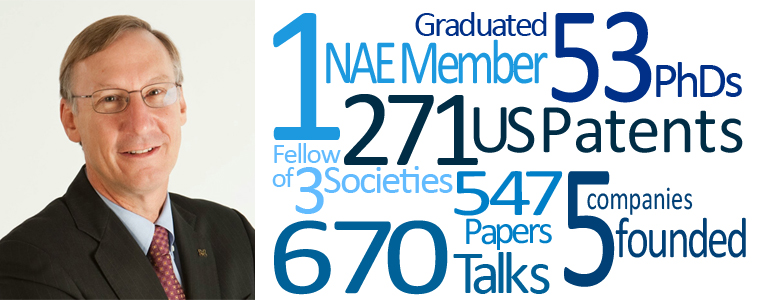Stephen Forrest receives 2015 Distinguished University Innovator Award
Prof. Forrest is widely acknowledged as one of the most successful academic inventors and entrepreneurs today.

 Enlarge
Enlarge
Stephen Forrest, Paul G. Goebel Professor of Engineering, has been awarded the 2015 U-M Distinguished University Innovator Award. This honor recognizes the demonstration of a transformational innovation, the movement of an innovation to market-readiness, or the creation of the new means for moving innovations from the University into the private sector. Prof. Forrest has accomplished these goals time and time again throughout his active career.
Prof. Forrest is widely acknowledged as one of the most successful academic inventors and entrepreneurs today. He directs the Optoelectronic Components and Materials (OCM) Laboratory, where he and his group focus on photovoltaic cells, organic light emitting diodes (OLEDs), and lasers & optics. The group has done groundbreaking work in each of those areas, including the production of phosphorescent OLEDs that are now used in cell phones and TVs, flexible, thin-film solar cells, organic photovoltaics, and photonic integrated circuits.
The biggest potential impact of his research is in energy – both its conservation and sustainability through solid-state lighting and organic solar cells. He recently received a grant from the Department of Energy to support his research in organic photovoltaics. This grant is specifically intended to fund research that will push scientifically sound and commercially promising solar technology into the marketplace as quickly as possible.
With his prolific research group, he has been issued 271 U.S. patents to date, more than 95 percent of them licensed to companies around the world. On top of this, he’s published more than 540 papers which have received more than 85,000 citations in Google Scholar, given nearly 700 talks at professional meetings and conferences, and participated in the founding of five companies: Epitaxx (purchased by JDSU), Sensors Unlimited (purchased by Goodrich), Universal Display Corp. (traded as OLED on NASDAQ), Global Photonic Energy Corp. (now NanoFlex Power Corp.) and ASIP Inc. (now part of Avago Technologies). These companies have generated more than 1,000 jobs and more than $250 million in corporate and personal taxes. Sensors Unlimited sold for approx. $650M, and Universal Display Corp. has a current market capitalization close to $2B.
As U-M’s Vice President for Research (a position held from 2006 to 2013), Steve initiated several key processes that have helped make Michigan one of the leading institutions in the country in the area of tech transfer. For example, he instituted the Business Engagement Center – which doubled U-M industry research volume in only 6 years. He worked with the Office of Technology Transfer and the Office of Research Sponsored Programs to streamline the agreement process between university researchers and external organizations. He instituted blanket research agreements with large companies, and he implemented the Michigan Research Advantage program to facilitate and expand ties to industry.
In addition to his impact as a scientist, researcher, and entrepreneur, Prof. Forrest’s role as an educator ensures a legacy of a different type. He has graduated 53 Ph.D. students, many of whom have gone on to either start productive businesses of their own or teach at top institutions throughout the world.
One of the greatest joys of being a professor is to be able to create in any way you choose. I have found that working with students in a culture of invention and innovation has been the highlight of my career. Then to have those innovations solve problems for people in their day to day lives, or to make the country more secure, sometimes even while the student who has led the process has not even finished his or her academic program, is extraordinarily exciting.
Prof. Forrest is a member of the National Academy of Engineering and the National Academy of Inventors. He is the recipient of many major awards, including: the IEEE Daniel E. Noble Prize for “innovations in organic light emitting devices”; the IEEE/LEOS Distinguished Lecturer Award; the IPO National Distinguished Inventor Award; the Thomas Alva Edison Award for innovations in organic LEDs; and the Materials Research Society Medal “for pioneering contributions to the growth and optoelectronic applications of organic semiconductor thin films.” He is a Fellow of IEEE, the American Physical Society (APS), and the Optical Society of American (OSA). He has been named by Thompson Reuters top 1% of cited researchers in both physics and materials science.
He has served on dozens of professional and industrial boards and committees, and is currently a board or committee member of eight organizations. These include PD-LD, Inc., Technion Board of Governors, Universal Display Corp, NanoFlex Power Corp., Applied Materials, University Musical Society (serving as vice chairman of the board) and Ann Arbor SPARK, of which he was a founding member.
This year’s public award ceremony will take place on Tuesday, May 5, at 4:00 pm in the Stamps Auditorium in the Charles R. Walgreen, Jr. Drama Center on North Campus. After receiving the award, Dr. Forrest will deliver a lecture entitled “An Academic’s Adventures in Business.” A reception will follow.
In the Media
Symposium marks growth for Princeton’s materials institute
EECS-ECE Prof. Stephen Forrest was honored at Princeton as a keynote speaker where he spoke about innovation and the importance of cooperation among science, academia, and industry.
 MENU
MENU